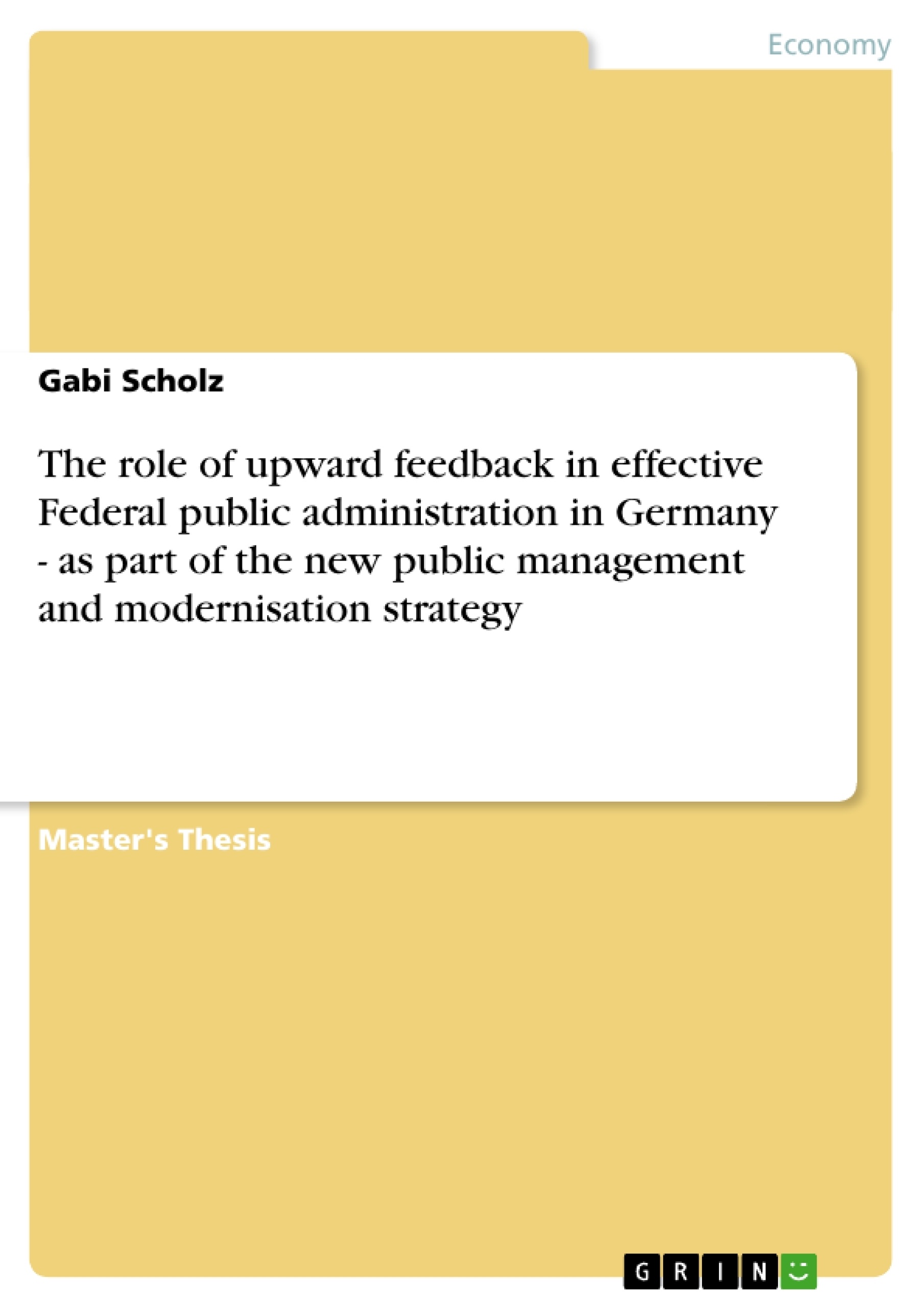Recently, private and public organisations have been using upward feedback to meet new challenges in human resource management in public administration. Most of the discussions dealing with the accurate use of ‘modern instruments’ like upward feedback for the management development process can be found outside Germany. Upward feedback focuses on managerial development rather than having a judgemental purpose.
This paper addresses literature research dealing with upward feedback, which suggests that upward feedback can lead to performance improvement. Most research studies discuss the use of this instrument in private companies or in local public agencies. There is almost nothing in the literature about whether upward feedback is used at the federal administrative level in Germany. Consequently, this the paper examines whether the instrument of upward feedback is really used rarely at the federal administrative level in Germany. To analyse whether the instrument of upward feedback is used at the federal administrative level in Germany the researcher designed a questionnaire, which was sent to all 15 supreme federal authorities (the Federal Chancellery and the fourteen Federal Ministries) and to 54 subordinate federal administrations along with information regarding the purpose of the research. Information from 69 respondents shows that 16 % of federal authorities are already using the instrument on a regular basis, one for ten years and another for eight years. Some 22 % are planning implementation in the near future and two of these have already undertaken a pilot project with good results.
The paper identifies salient concepts, in the field of upward feedback, which are currently being employed in the private and the public sector. No ideal approach can be found in either the literature or in practice. However, one fundamental conclusion was identified: it is not enough simply to receive feedback. An organisation has to take further aspects into account, for example to define and communicate the purposes of the feedback before starting the feedback programme, to help employees to interpret and react to the ratings and to set up rules on how managers are to deal with the results etc. If this is done, the instrument can be a powerful tool for managerial developmental purposes.
Inhaltsverzeichnis (Table of Contents)
- Management Summary
- Introduction
- History
- Development
- New Public Management
- Trends in Germany
- Upward feedback
- Definition
- The theoretical background of the instrument ‘upward feedback’
- The benefits of upward feedback
- The purposes of the upward feedback
- Appraisal versus Development
- Cultural Change, Communication and Team work
- Motivation
- Improving Leadership through development
- Overview of the formal components and anonymity versus open
- Covered areas: Items to be rated
- How to deal with feedback findings
- The practical background of ‘upward feedback’
- Methodology
- Results
- Limitations of the Research
- Conclusion
- Managerial Implications
Zielsetzung und Themenschwerpunkte (Objectives and Key Themes)
This paper investigates the use of upward feedback in German federal public administration as part of the New Public Management (NPM) modernization strategy. It examines the existing literature on upward feedback, its application in private and public sectors, and its practical implementation within the German federal government.
- The role of upward feedback in improving performance within public administration.
- A comparison of upward feedback practices in private and public sectors.
- An analysis of the current state of upward feedback implementation in German federal authorities.
- Identification of key factors influencing the success of upward feedback programs.
- Recommendations for improving the effectiveness of upward feedback in German federal public administration.
Zusammenfassung der Kapitel (Chapter Summaries)
The Introduction sets the stage, discussing the growing importance of upward feedback in modern organizations. The History chapter provides background on the development of upward feedback. Development explores the context of New Public Management and trends in Germany, specifically focusing on the adoption of upward feedback. The Definition section delves into the theoretical underpinnings of upward feedback, exploring its benefits and various purposes, including appraisal versus development, impact on team dynamics, and leadership improvement. The chapter on the Practical Background of Upward Feedback outlines the research methodology, presents the findings from a survey of German federal authorities, and acknowledges limitations of the study.
Schlüsselwörter (Keywords)
Upward feedback, New Public Management (NPM), German federal administration, performance improvement, managerial development, public sector, human resource management, organizational change, qualitative research, quantitative research, survey.
Frequently Asked Questions
What is "upward feedback" in public administration?
It is a management tool where employees provide feedback to their supervisors, primarily for managerial development and performance improvement.
Is upward feedback used in German federal ministries?
Research shows that about 16% of federal authorities use it regularly, and 22% are planning to implement it in the near future.
What are the benefits of upward feedback?
It can lead to improved leadership, better communication, increased motivation, and supports cultural change within the organization.
What is the role of New Public Management (NPM) here?
Upward feedback is part of the NPM modernization strategy, which aims to apply private-sector management instruments to the public sector.
What is necessary for a successful feedback program?
Organizations must define clear purposes, ensure anonymity, and provide support for managers to interpret and react to the ratings effectively.
- Citar trabajo
- MBA, Dipl.-Verwaltungswirtin Gabi Scholz (Autor), 2008, The role of upward feedback in effective Federal public administration in Germany - as part of the new public management and modernisation strategy, Múnich, GRIN Verlag, https://www.grin.com/document/124974



